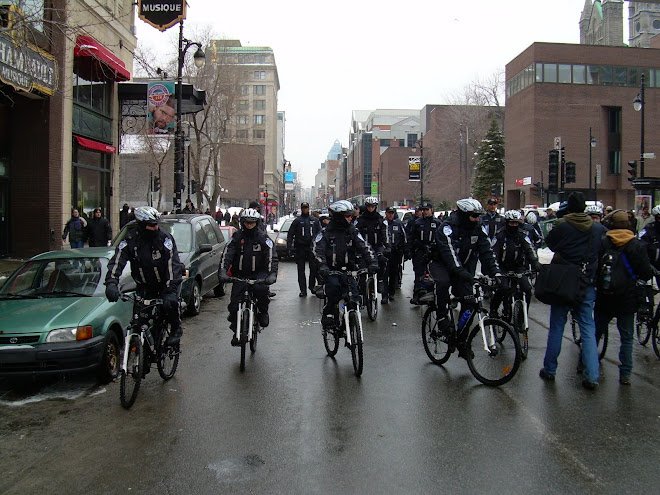I've been neglecting to blog of late; I want to say that 'life gets in the way' - but I could hardly justify the distinction.
A few notes on ethics, as promised: I'm just going to lay out the basics, and do so (in part at least) in order that I have a nice accessible ethical 'mission statement' that I can refer people to if any questions should arise about what I'm up to with this project. Which leads me to my first point...while I'm certainly not interested in broadcasting my identity or the (somewhat acdemic) nature of my activities in an unnecessarily public manner, I will certainly make a point not to risk any kind of misrepresentation.
In looking at the blogs I've noted, commenting or discussing connected issues in anarchist forums, or hopping around the Indy-and-otherwise hyperlinked cluster of accounts about the Greek situation, I feel little ethical compunction about furthering my plans for research without a blanket self-disclosure (beyond the basic obligations to fair re-presentation and avoiding identifying information - these are, after all, public forums for the dissemination of information and opinionated interaction). Nonetheless, if anyone cares to ask me what I'm up to or who I am (and, of course, in any case where I might seek online interviews, etc.), I intend to disclose the basic focus of my project and a thumbnail sketch of my own background; if this provokes particular interest, I will refer anyone so inclined to this blog - where, among other things, they can read this blurb on ethics. Particularly in the case of possible online interviewing, I am rather inclined to encourage potential discussants to read the blog (or at least give them a substantive account of what's on my mind)...as it seems to me that the more they know what I've been thinking, the more potential for productive discussion. Think of it as well-informed consent.
In part, these thoughts derive from last week's class discussion about interview questions (although they'd been brewing in advance); it seems to me that a good way to sidestep the problem of constructing questions that seek to elicit answers by isolating the information that I think potential 'subjects' might have hidden (extractable via the 'correct' question) is to try to foster more of a mutual-disclosure pact...something like a real conversation. Asking people about issues or questions/problems that matter to them (and perhaps more widely in 'communities' or 'networks') strikes me as a fine corrective for (some) more traditional social-scientists' - lol - tendency to guard their real objectives behind sharply instrumentalized forms of questioning.
As I consider the potential currents this project might drift along with, I am increasingly inclined towards certain ideas of theory-building and collaborative research from both an anarchist-academic and broader social science milieu, for example:
Gordon, Uri. 2007. “Practicing Anarchist Theory: Towards Participatory Political Philosophy” in Constituent Imagination: militant investigations, collective theorization edited by David Graeber and Stephen Shakaitis. Oakland, CA: AK Press.
Bevington, Douglas and Chris Dixon. 2005. “Movement-relevant theory: rethinking social movement theory and activism.” Social Movement Studies 4(3): 185-208.
...or even Jeffrey Juris' (2008) notion of a 'militant ethnography,' in which he attempts to reconcile genuine commitment and participation in the alter-globalization movement(s) with an ethnographic agenda. The theme to be emphasized throughout is essentially that the activists, bloggers, organizers, commentators, etc. have a great deal more knowledge (unsurprisingly) of their own activities and the nested contexts of their actions than a passing researcher - but that an academic undertaking an ethnographic project in such a sphere nonetheless has some responsibility to try to make a non-trivial contribution, in good faith and without any kind of deception or deliberately surrepetitious probing. An ideal that is somewhat collaborative, then, might allow the researcher to work towards this responsibility at the same time that it allows the effective mobilization of the 'endemic' knowledge of activists, etc., in a way that could conceivably mark a mutually beneficial process. Long story short: I'm not interested in getting into the hinterworlds of human action and explaining others from behind their backs - I'm interested in putting myself in a position to engage with what others are trying to do, even if I'm not necessarily 'on board.' And hopefully, this approach could prove productive of more than just grades, a class presentation, and another file on my memory key.
I should probably mention at this point that I do consider myself to have some definite anarchist inclinations (one might pick this up in some of my offhand references); I think that this fact, in parallel with my pre-established interest in anarchist and radical-left thought and movements, places me in a decent position to take part in, for example, online discussions and commentary among the radical-left followers of the recent (and ongoing) events in Greece...though my ambivalent thoughts on some of the difficult questions raised by the 'insurrection-inclined' will no doubt have a chance gain traction before this thing is done. And, hopefully, the (still limited) background I have in some adjacent spheres might dampen the effects of an extremely limited period of exploration. The fact that my academic and extra-academic interests converge here serves to keep things interesting - though it may also create some ambiguity as to whether I'm 'on' or 'off' as a researcher at a given time, a question to which I ought to remain attentive.
Of course the above is exhaustively non-exhaustive in its attempt to suggest some guiding ideas. Ethical language (assurances or ideals of 'good faith,' 'informed consent,' 'mutualism,' etc.) is never quite up to the vigilance-inducing task of ethics-in-practice. As Ludwig Wittgenstein suggests:
“the tendency of all men who ever tried to write or talk Ethics or Religion was to run against the walls of language” (1965:11-12).



